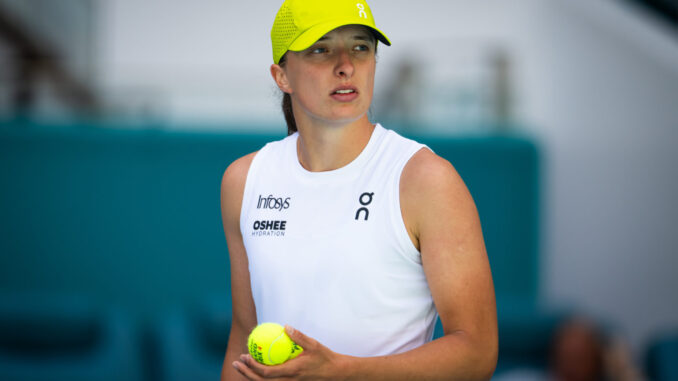
In the high-octane world of professional tennis, where resilience and grit often define a champion, Iga Swiatek, the Polish superstar and world No. 2, has sent shockwaves through the sport with a bombshell decision. On April 2, 2025, just days before the Billie Jean King Cup Qualifiers were set to ignite in Radom, Poland, Swiatek announced she’s stepping away from the event—a move that’s left fans reeling and her national team facing an uphill battle. After a 2025 season marked by a disheartening losing streak that’s dimmed her usual brilliance, Swiatek’s choice to prioritize her own well-being over national duty has sparked both concern and admiration. “Fingers crossed for the girls,” she said, her words a bittersweet blend of support and surrender as she turns her focus inward.
Swiatek’s year has been a rollercoaster, a far cry from the dominance that’s defined her career. The 23-year-old, who boasts five Grand Slam titles—including four French Open crowns—started 2025 with promise, steering Poland to the United Cup final and reaching the Australian Open semi-finals. But the wheels began to wobble. A narrow loss to Madison Keys in Melbourne set the tone for a string of disappointments: quarter-final exits in Doha and Dubai to Jelena Ostapenko and Mirra Andreeva, respectively, followed by a semi-final stumble against Andreeva at Indian Wells. The Miami Open delivered the final blow—a quarter-final defeat to 19-year-old Alexandra Eala, a rising star who outshone Swiatek under the Florida sun. With no finals reached this season, her 21-6 record feels more like a shadow than a spotlight for a player accustomed to hoisting trophies.
The decision to skip the Billie Jean King Cup Qualifiers, where Poland was set to face Switzerland and Ukraine from April 10-12, isn’t just a logistical pivot—it’s a seismic shift for a team that leaned on Swiatek’s firepower to reach historic heights. Last year, she was the linchpin of Poland’s run to the BJK Cup semi-finals, a first for the nation, and their United Cup final appearance. “I played everything there was to play for the country last year,” she reflected, her pride evident despite the exhaustion etched into her words. “I am extremely proud of the historic team successes—the BJKC semifinals and the UC finals.” Her singles record in team events is a testament to her commitment: 9-2 in BJK Cup play, with four wins in five United Cup rubbers this year. Yet, after a season that’s drained her physically and mentally, Swiatek is waving the white flag—not out of defeat, but necessity.
“I have made a difficult decision,” she admitted, her announcement unfolding like a heartfelt confession. “I know that this is not the information that fans, especially Polish ones, wanted, nevertheless it is the right decision for me for now.” The qualifiers, hosted on home soil, were poised to be a rallying cry for Poland, with Swiatek as the spearhead against formidable foes. Instead, Magda Linette will lead a squad featuring Magdalena Frech, Maja Chwalinska, and Katarzyna Kawa—a talented group, but one that loses a titan without their No. 2-ranked star. “Now it’s time for more balance, focusing on myself and my training,” Swiatek explained, a nod to the grueling toll of a schedule that’s left little room for recovery. Her hope for her teammates shines through: “I keep my fingers crossed for the girls and for the whole team.”
This isn’t the first time Swiatek has wrestled with the relentless demands of the tennis calendar. Last year, she famously decried the WTA’s scheduling, calling a 12-hour travel window between the WTA Finals and BJK Cup “not safe for our health.” She’s long been vocal about player burnout, a stance that resonates now as she opts for self-preservation over another week of battle. The clay season looms large—her kingdom, where she’s reigned supreme with a 95% win rate at Roland Garros. With new coach Wim Fissette in her corner after parting ways with Tomasz Wiktorowski, this break could be the reset she needs to reclaim her throne. “I think we have too many tournaments in the season,” she remarked last summer, a sentiment that’s clearly guiding her now.
For Polish fans, the news stings. Swiatek isn’t just a player—she’s a national treasure, the first from her country to hit No. 1 and a beacon of pride. Her bronze medal at the 2024 Paris Olympics, won on the clay of Roland Garros, only deepened that bond. But this season’s struggles—coupled with a brief doping suspension in 2024 that rattled her world—have humanized a champion once seen as invincible. The Miami loss came with added baggage: verbal abuse from a spectator during practice forced extra security, a reminder of the pressures beyond the baseline. “It was the season of not being a superhero and accepting it,” she wrote at the end of 2024, words that echo now as she seeks balance.
As Poland prepares to fight without her, Swiatek’s absence is a gamble—for her team’s chances and her own resurgence. Will this hiatus sharpen her edge for the clay courts, or will the losing streak linger? For now, she’s stepping back, leaving the girls to carry the torch, her fingers crossed and her focus fixed on a comeback that could redefine her 2025.
Leave a Reply